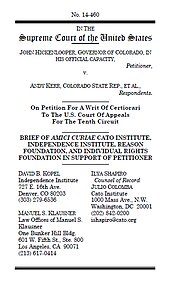Learn more about Cato’s Amicus Briefs Program.
Not many people know that there’s a clause in the Constitution that charges Congress with guaranteeing every state a “republican form of government.” What even fewer people are aware of is exactly what that means. Historically, the Guarantee Clause is considered to have been a measure the Framers included to ensure that state governments of the states—which used to have far greater autonomy—didn’t devolve into monarchies or other despotic forms. But the clause’s legal effect has never been fully fleshed out. Not that there haven’t been opportunities; claims based on the Guarantee Clause are peppered throughout U.S. history. Courts have typically disposed of them by invoking the political question doctrine, which they use to avoid deciding an issue they believe is more appropriately left to the elected branches. Since there’s no legally binding definition of “republican,” a court applying the Guarantee Clause has little to work with, also contributing to the tendency to treat such cases as non-justiciable. Accordingly, when a group of legislators and citizens groups supporting big government banded together to attack Colorado’s Taxpayer Bill of Rights (TABOR) based on a Guarantee Clause claim, it seemed like a longshot. Their claim was that the state no longer had a republican form of government because the TABOR—a voter-approved state constitutional amendment—restricts the legislature’s ability to raise taxes without approval from the people of Colorado. Colorado’s (Democratic) governor, defending the state’s constitution, moved to dismiss the case in federal district court, but, surprisingly, lost the motion. Even more surprisingly, a panel of the U.S. Court of Appeals for the Tenth Circuit affirmed that denial, which meant that the plaintiffs’ claims could go to trial and jeopardize the continued existence of the state’s popular anti-tax measure. Colorado has one more chance, however, to prevent poorly constructed Guarantee Clause claims from being heard in federal courts and thus jeopardizing the dozens of state constitutional measures that use popular input: the Supreme Court. Governor Hickenlooper has filed a petition for certiorari requesting that the Supreme Court, among other things, put to bed the erroneous notion that elements of direct popular participation and direct democracy can’t exist in a republican government. Joined by the Independence Institute, Reason Foundation, and Individual Rights Foundation, Cato has filed a brief supporting Colorado’s petition. We argue that the Court should hear the case so it can inform the lower courts that pretextual Guarantee Clause claims don’t belong in federal courts. We give three reasons for this position. First, the plaintiffs’ complaint fails to provide a court with legal standards coherent enough to decide the case under the Guarantee Clause. Second, under Supreme Court precedent, the idea that initiatives and referenda are incompatible with republican government was resolved (and rejected) when Congress admitted states that used these popular procedures into the union. Third, even a brief look at the history of the Founding Era’s understanding of the words “republic” and “republican” dispels the myth on which the plaintiffs base their claim: that direct popular participation is incompatible with the republican form. Our brief provides that historical context. In sum, the suggestion that the Guarantee Clause—meant to ensure that state governments would remain governments “of the people” and wouldn’t revert to despotic monarchies—could be used to wrest greater control of the taxing power from the people makes the plaintiffs’ claims risible. The Supreme Court should take this opportunity to put an end to this laughable case.

This work is licensed under a Creative Commons Attribution-NonCommercial-ShareAlike 4.0 International License.
